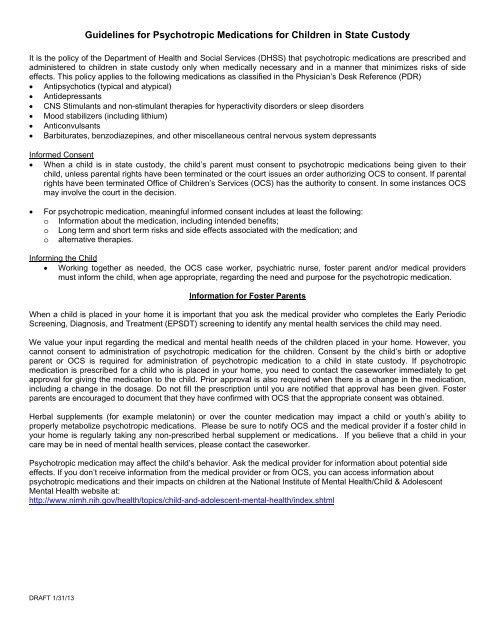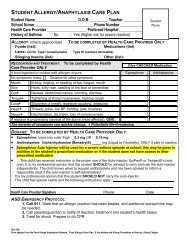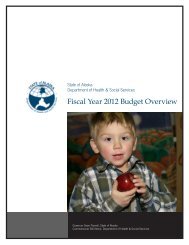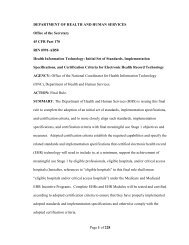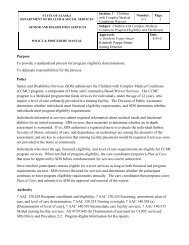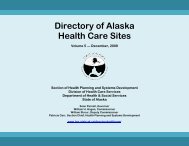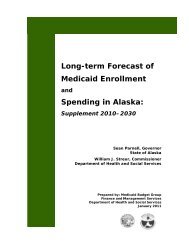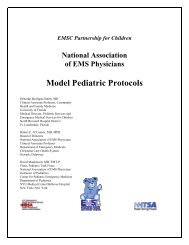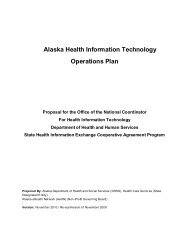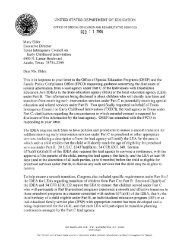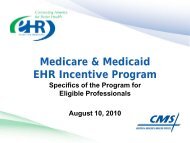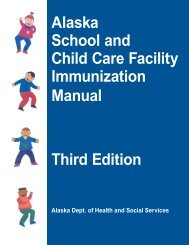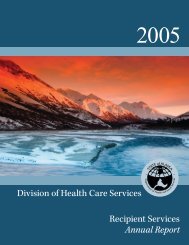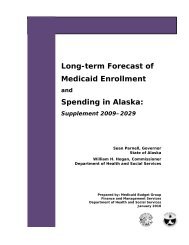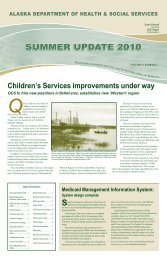Guidelines for Psychotropic Medications for Children in State Custody
Guidelines for Psychotropic Medications for Children in State Custody
Guidelines for Psychotropic Medications for Children in State Custody
You also want an ePaper? Increase the reach of your titles
YUMPU automatically turns print PDFs into web optimized ePapers that Google loves.
<strong>Guidel<strong>in</strong>es</strong> <strong>for</strong> <strong>Psychotropic</strong> <strong>Medications</strong> <strong>for</strong> <strong>Children</strong> <strong>in</strong> <strong>State</strong> <strong>Custody</strong><br />
It is the policy of the Department of Health and Social Services (DHSS) that psychotropic medications are prescribed and<br />
adm<strong>in</strong>istered to children <strong>in</strong> state custody only when medically necessary and <strong>in</strong> a manner that m<strong>in</strong>imizes risks of side<br />
effects. This policy applies to the follow<strong>in</strong>g medications as classified <strong>in</strong> the Physician’s Desk Reference (PDR)<br />
• Antipsychotics (typical and atypical)<br />
• Antidepressants<br />
• CNS Stimulants and non-stimulant therapies <strong>for</strong> hyperactivity disorders or sleep disorders<br />
• Mood stabilizers (<strong>in</strong>clud<strong>in</strong>g lithium)<br />
• Anticonvulsants<br />
• Barbiturates, benzodiazep<strong>in</strong>es, and other miscellaneous central nervous system depressants<br />
In<strong>for</strong>med Consent<br />
• When a child is <strong>in</strong> state custody, the child’s parent must consent to psychotropic medications be<strong>in</strong>g given to their<br />
child, unless parental rights have been term<strong>in</strong>ated or the court issues an order authoriz<strong>in</strong>g OCS to consent. If parental<br />
rights have been term<strong>in</strong>ated Office of <strong>Children</strong>’s Services (OCS) has the authority to consent. In some <strong>in</strong>stances OCS<br />
may <strong>in</strong>volve the court <strong>in</strong> the decision.<br />
• For psychotropic medication, mean<strong>in</strong>gful <strong>in</strong><strong>for</strong>med consent <strong>in</strong>cludes at least the follow<strong>in</strong>g:<br />
o In<strong>for</strong>mation about the medication, <strong>in</strong>clud<strong>in</strong>g <strong>in</strong>tended benefits;<br />
o Long term and short term risks and side effects associated with the medication; and<br />
o alternative therapies.<br />
In<strong>for</strong>m<strong>in</strong>g the Child<br />
• Work<strong>in</strong>g together as needed, the OCS case worker, psychiatric nurse, foster parent and/or medical providers<br />
must <strong>in</strong><strong>for</strong>m the child, when age appropriate, regard<strong>in</strong>g the need and purpose <strong>for</strong> the psychotropic medication.<br />
In<strong>for</strong>mation <strong>for</strong> Foster Parents<br />
When a child is placed <strong>in</strong> your home it is important that you ask the medical provider who completes the Early Periodic<br />
Screen<strong>in</strong>g, Diagnosis, and Treatment (EPSDT) screen<strong>in</strong>g to identify any mental health services the child may need.<br />
We value your <strong>in</strong>put regard<strong>in</strong>g the medical and mental health needs of the children placed <strong>in</strong> your home. However, you<br />
cannot consent to adm<strong>in</strong>istration of psychotropic medication <strong>for</strong> the children. Consent by the child’s birth or adoptive<br />
parent or OCS is required <strong>for</strong> adm<strong>in</strong>istration of psychotropic medication to a child <strong>in</strong> state custody. If psychotropic<br />
medication is prescribed <strong>for</strong> a child who is placed <strong>in</strong> your home, you need to contact the caseworker immediately to get<br />
approval <strong>for</strong> giv<strong>in</strong>g the medication to the child. Prior approval is also required when there is a change <strong>in</strong> the medication,<br />
<strong>in</strong>clud<strong>in</strong>g a change <strong>in</strong> the dosage. Do not fill the prescription until you are notified that approval has been given. Foster<br />
parents are encouraged to document that they have confirmed with OCS that the appropriate consent was obta<strong>in</strong>ed.<br />
Herbal supplements (<strong>for</strong> example melaton<strong>in</strong>) or over the counter medication may impact a child or youth’s ability to<br />
properly metabolize psychotropic medications. Please be sure to notify OCS and the medical provider if a foster child <strong>in</strong><br />
your home is regularly tak<strong>in</strong>g any non-prescribed herbal supplement or medications. If you believe that a child <strong>in</strong> your<br />
care may be <strong>in</strong> need of mental health services, please contact the caseworker.<br />
<strong>Psychotropic</strong> medication may affect the child’s behavior. Ask the medical provider <strong>for</strong> <strong>in</strong><strong>for</strong>mation about potential side<br />
effects. If you don’t receive <strong>in</strong><strong>for</strong>mation from the medical provider or from OCS, you can access <strong>in</strong><strong>for</strong>mation about<br />
psychotropic medications and their impacts on children at the National Institute of Mental Health/Child & Adolescent<br />
Mental Health website at:<br />
http://www.nimh.nih.gov/health/topics/child-and-adolescent-mental-health/<strong>in</strong>dex.shtml<br />
DRAFT 1/31/13
In<strong>for</strong>mation <strong>for</strong> Medical Providers<br />
A medical provider who prescribes psychotropic medication <strong>for</strong> a child <strong>in</strong> OCS custody is required to provide <strong>in</strong><strong>for</strong>mation<br />
about the medication as well as the recommended mental health services, to the person who is authorized to consent to<br />
adm<strong>in</strong>istration of the medication, i.e. the child’s parent or the OCS caseworker. The <strong>in</strong><strong>for</strong>mation may be provided either on<br />
the OCS <strong>for</strong>m “In<strong>for</strong>med Consent: In<strong>for</strong>mation about Recommended Prescription Medication and Major Medical Care” or<br />
on another document. The <strong>for</strong>m is available on the OCS website, <strong>in</strong> the Foster Care section: Applications and Resource,<br />
Under Forms <strong>for</strong> Current Foster Parents. Provider <strong>Guidel<strong>in</strong>es</strong> <strong>for</strong> <strong>Psychotropic</strong> Medication <strong>for</strong> <strong>Children</strong> <strong>in</strong> <strong>State</strong> <strong>Custody</strong>.<br />
OCS policy requires the OCS psychiatric nurses to review the medical records/<strong>in</strong><strong>for</strong>mation of children <strong>in</strong> custody who are<br />
prescribed psychotropic medication, and medical providers are required to provide a copy of the child’s medical chart to<br />
the OCS psychiatric nurse or caseworker when requested and provide updates when there are changes.<br />
Medical monitor<strong>in</strong>g <strong>for</strong> children on psychiatric medications<br />
DHSS expects medical providers prescrib<strong>in</strong>g medications to treat children with psychiatric diagnosis to monitor <strong>for</strong><br />
adverse drug reactions on a cont<strong>in</strong>u<strong>in</strong>g basis.<br />
• For children on more than two atypical antipsychotics, monitor<strong>in</strong>g must <strong>in</strong>clude:<br />
a. Per<strong>for</strong>m<strong>in</strong>g a BMI (Body Mass Index) on the child at least once a month to identify excessive or <strong>in</strong>appropriate<br />
weight ga<strong>in</strong> or loss. DHSS recognizes “excessive or <strong>in</strong>appropriate weight ga<strong>in</strong>” as >10% <strong>in</strong>crease <strong>in</strong> body<br />
weight with<strong>in</strong> a 3 month timeframe or less.<br />
b. Laboratory monitor<strong>in</strong>g per<strong>for</strong>med biannually <strong>in</strong>clud<strong>in</strong>g:<br />
o Fast<strong>in</strong>g glucose levels<br />
o Fast<strong>in</strong>g lipid levels<br />
If monitor<strong>in</strong>g identifies a medical abnormality or adverse drug reaction, the medical provider will develop an updated<br />
treatment plan that <strong>in</strong>cludes how the identified problem will be addressed, who will address the problem, and <strong>in</strong> what<br />
timeframes.<br />
• Additional monitor<strong>in</strong>g <strong>for</strong> children age five or younger who are receiv<strong>in</strong>g psychotropic medication and <strong>for</strong> children on<br />
any age who are receiv<strong>in</strong>g four or more psychotropic medications or two or more atypical antipsychotics<br />
DHSS will per<strong>for</strong>m a review of the child’s chart and determ<strong>in</strong>e if there is a need <strong>for</strong> further consultation with the<br />
medical provider.<br />
Medicaid Claim<strong>in</strong>g - Required Prior Authorization of Atypical Antipsychotics<br />
a. The contemporaneous use of more than one (1) atypical antipsychotic <strong>in</strong> a child less than 18 years old will require<br />
the prescriber to obta<strong>in</strong> prior authorization and provide documentation that the medication to be added is<br />
medically necessary. The requirement to obta<strong>in</strong> prior authorization <strong>for</strong> multiple atypical antipsychotics will be<br />
uni<strong>for</strong>mly applied to all children enrolled with Alaska Medicaid.<br />
b. Doses, or regimens, of atypical antipsychotics exceed<strong>in</strong>g the Maximum Units per 30 Days will require justification<br />
of medical necessity from the medical provider. The Maximum Units per 30 Days will be uni<strong>for</strong>mly applied to all<br />
claims <strong>for</strong> atypical antipsychotics <strong>for</strong> all Alaska Medicaid recipients.<br />
DRAFT 1/31/13


